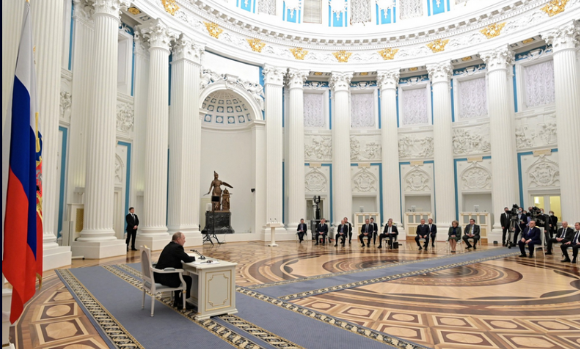Putin's former repressive authoritarianisme since the invasion of Ukraine has morphed into a new form of government: neo-totalitarianism. Public discourse is captured by warmongers, pluralism in the ruling elite is wiped out and the population is politically mobilised for a long war, based on a war economy, says Maria Domańska for the Polish thinktank OSW in Warsaw. Fear reigns and Putin will go for re-election in 2024. Only a Ukrainian victory can change the picture.
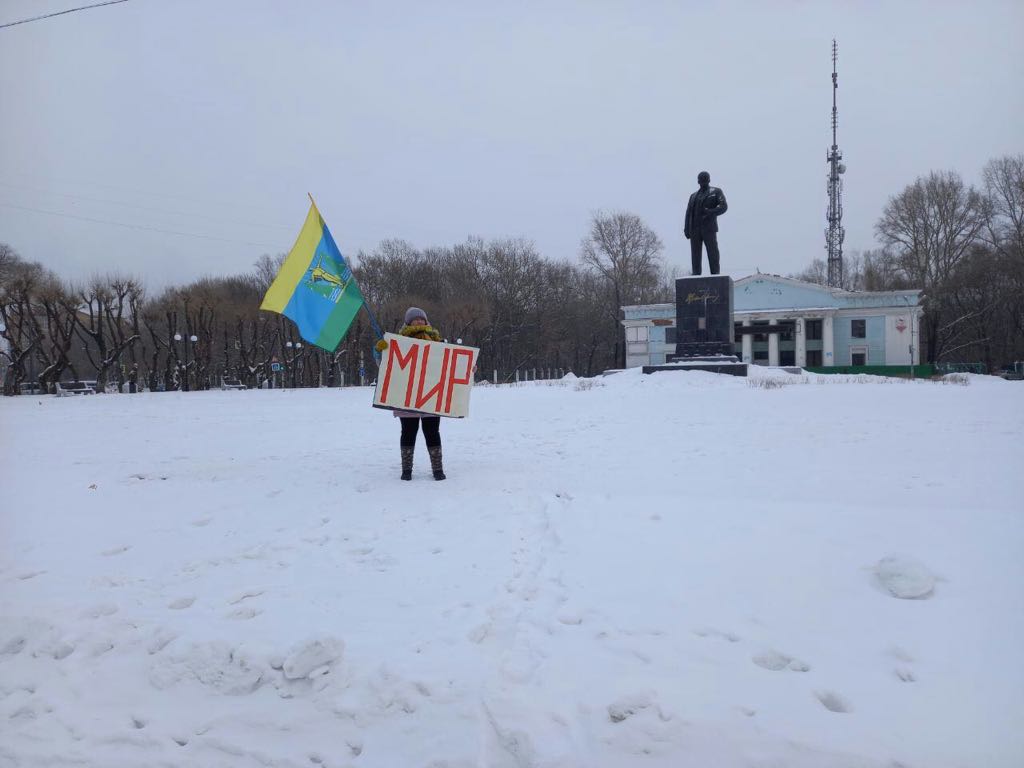 Lonely protest in Komsomolsk on the Amur (picture twitter)
Lonely protest in Komsomolsk on the Amur (picture twitter)
by Maria Domańska
As the invasion of Ukraine began, the totalitarian ambitions of the Putin regime were revealed on a larger scale than ever before. These designs have been reflected in increased repression, the unprecedented encroachment of the state into the private lives of citizens, the growing ideologisation of the public discourse, and top-down efforts to mobilise public support for the war. The regime is dismantling the previous semblance of pluralism that had existed within the ruling elite.
There is no sign of a coming split within the political establishment and business circles, while society is demonstrating great adaptability to the realities of armed conflict. Even forced deployments of citizens to the frontline have not met with any significant resistance. This situation is likely to continue unless Russia suffers a crushing military defeat in Ukraine. It should be assumed that Vladimir Putin will run in the presidential election scheduled for March 2024 and build his legitimacy on the myth of ‘defensive war’ against the West.
New model of government
The domestic political developments in Russia in 2022 were determined by the aggression against Ukraine and the government’s ensuing drive to stamp out any resistance to the war. This exacerbated a number of negative trends in domestic policy, which had been building up for a decade since Putin’s return to the presidency in 2012. As a result, a qualitatively new model of government has been formed, one which has taken the form of neo-totalitarianism. Several key features set it apart from the pre-war dictatorship.
Firstly, any semblance of pluralism in the ruling elite has been dismantled. Until 2022, Putin permitted limited dissent on foreign policy issues and allowed (in a largely pro forma manner) moderately liberal views on domestic issues as long as they did not violate the overriding principle of loyalty to the president. The Security Council meeting on 21 February 2022 opened a new phase in relations between the Russian leader and the ruling group. The key figures in the state received a clear signal that Putin expected them to enthusiastically nod in approval at even the most controversial decisions taken without any involvement of the majority of the formal state leadership.
As time passed and the military suffered more setbacks on the battlefront, the Kremlin’s tolerance for some senior officials tacitly distancing themselves from the invasion issue began to wane. Putin’s earlier ‘corruption contract’ with the political and business elite also came to an end: due to the sanctions, only a narrow group can continue milking state resources with impunity, while the wealth of the rest is melting away.
Secondly, the Kremlin is attempting to carry out an unprecedented social experiment in the midst of armed conflict. After two decades of discouraging Russians from engaging in state affairs and ‘big politics’ (an approach typical of an authoritarian model of rule), 2022 saw top-down efforts to mobilise them around the government’s aggressive goals (a shift to a totalitarian model). The citizens were pushed to ‘patriotically’ support the Kremlin, and the ground for this push was prepared through stepped-up repression, censorship and mass indoctrination.
Mounting political persecution
The scale of political persecution increased markedly in 2022. The primary targets were participants of an anti-war protest that was nipped in the bud. Pacifism is treated as an anti-state attitude. Human rights defenders estimate the number of arrests and detentions of people opposing the invasion at nearly 20,000. There have been frequent reports of physical and psychological violence against demonstrators and detainees by officers of the police, the Federal Security Service (FSB) and Rosgvardia.
As of December 2022, criminal proceedings had been brought against 378 people while 51 had been sentenced. City councillors Alexei Gorinov and Ilya Yashin received the harshest prison sentences, 6 years and 11 months, and 8 years and 6 months respectively, for disseminating alleged fake news about the crimes of the Russian army in Ukraine. There have even been reports of the police persecuting children who displayed anti-war attitudes.
The catalogue of repressive legislation expanded to include more than twenty new laws in 2022, including one that provides for life imprisonment for sabotage and also penalises ‘justification of sabotage’ and ‘propaganda of sabotage’, which creates virtually unlimited options to persecute anyone who calls to oppose the war.
Political repression often comes in the form of criminal charges for alleged terrorism, extremism, financial embezzlement or disrupting public order. At least 23 people have come under investigation for their contacts with Alexei Navalny’s ‘extremist’ organisations. The politician himself, who has been imprisoned since early 2021, received another sentence of nine years in a ‘strict regime’ penal colony for alleged embezzlement in March 2022; he is also facing ten other criminal cases.
Main organisations and grassroots initiatives that oppose the invasion have either been designated as ‘foreign agents’ (such as the Feminist Anti-War Resistance Movement) or outlawed as extremist (Vesna, Spring). 2022 also saw a marked increase in the number of arrests (20) and convictions (11) for ‘high treason’. Ivan Safronov, a former journalist with Kommersant, received the harshest sentence of 22 years’ imprisonment. By all indications, this was a punishment for his involvement in investigative journalism.
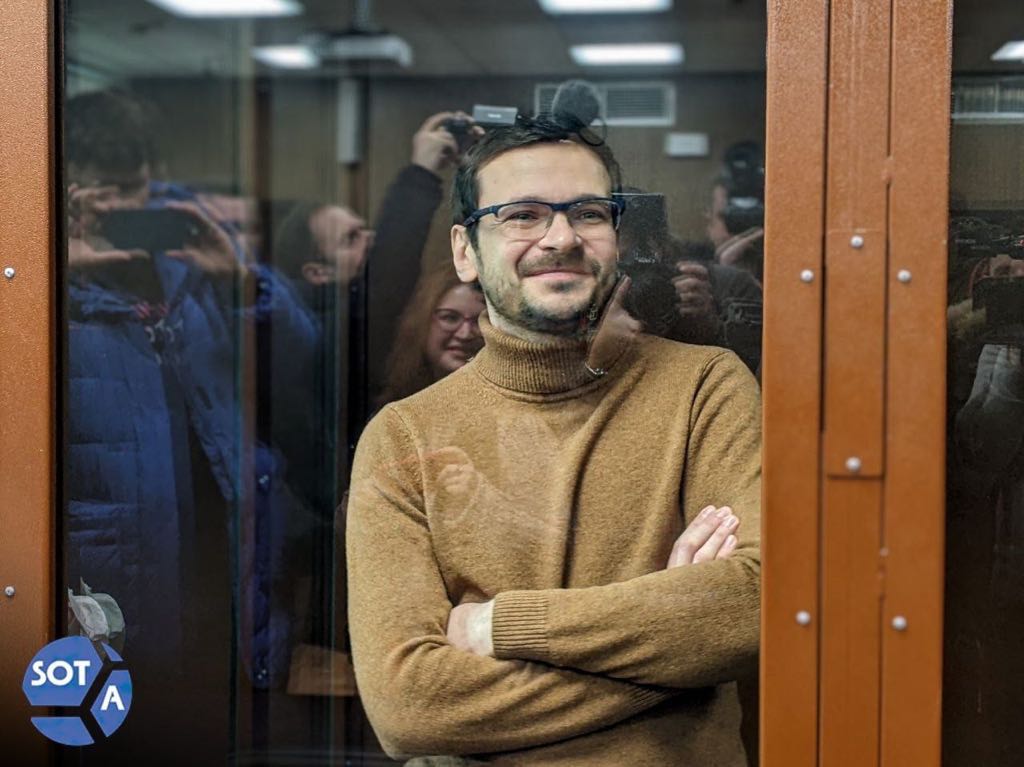 Opposition politician Ilya Yashin in court
Opposition politician Ilya Yashin in court
The number of individuals and organisations placed on the list of ‘foreign agents’ had risen to 536 at the end of January 2023, while the number of ‘undesirable organisations’ currently stands at 72, including Meduza, one of the leading Russian free media outlets, registered in Latvia. Collaboration with such organisations is punishable by imprisonment. The laws against ‘foreign agents’ have been tightened again; virtually any person or entity can be designated a foreign agent as long as the authorities claim they are under ‘foreign influence’. Almost one-fifth of ‘foreign agents’ are currently being harassed with criminal cases.
Censorship, surveillance and indoctrination
There are ongoing efforts to impose a full information blockade: narratives about the war that are inconsistent with official government statements have been declared illegal. Almost all independent media outlets were shut down, blocked or forced to drastically reduce their operations in 2022. The total number of blocked sources (websites, forums, blogs, etc.) has reached nearly 248,000. Russia was ranked 65th out of the 70 countries surveyed in the Freedom House’s 2022 internet freedom ranking, just ahead of countries such as Iran and China.
The repression and censorship have been accompanied by mass surveillance of the population by the secret services. Citizens are also encouraged to inform on ‘wrongdoers’, while educational establishments and law enforcement agencies scrutinise the views of both minors and their parents on the war.
The authorities are also employing mass propaganda and indoctrination with the use of the government-controlled media and education system, from kindergartens to universities. The so-called patriotic education is designed to instil in children and young people contempt for Ukrainian statehood, hatred for Ukrainian ‘Nazis’ and the West, and the paternalistic-imperialist idea of the ‘Russian world’ (Russkiy mir) and Russia’s greatness. The liberal-democratic system of values is demonised as a tool of anti-Russian ‘cognitive warfare’. A cult of war ‘heroes’ is developing, which includes criminals recruited for the front line (see below). Teachers, parents and students have varying attitudes towards such classes, but those who openly boycott or condemn them risk harassment and persecution, including through administrative and criminal cases.
Top-down mobilisation of popular support
The government responded to the grassroots protests which began immediately after the invasion was launched with repression against demonstrators and the top-down mobilisation of citizens to participate in ‘patriotic’ pro-war actions. In particular, state-dependent public sector employees were made to take part in anti-Ukrainian rallies, while spontaneous expressions of such attitudes were relatively rare.
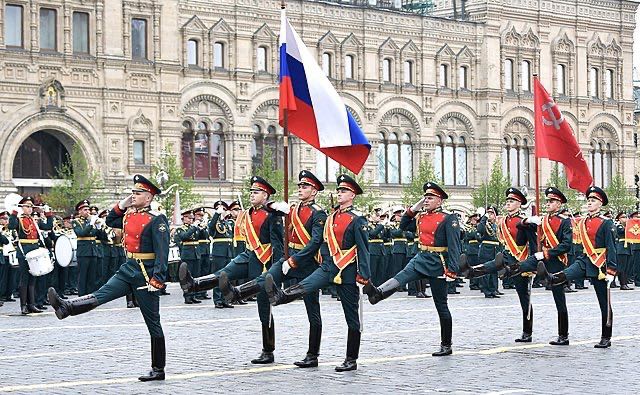 Military parade on Red Square
Military parade on Red Square
However, the eventual shift from an authoritarian ‘social contract’ based on passive support for the authorities to a totalitarian one that implies complicity in aggression and war crimes was made last September. It was then that Putin announced the first so-called partial military mobilisation since 1945. This jolted the Russian people out of their ‘comfort zone’ in which they could ‘free ride’ on the regime’s imperial resentments while denying individual responsibility for its actions. Poverty has proved to be an effective tool for managing public attitudes: military service is portrayed as the only effective and commendable route up the social ladder. This is accompanied by a cult of death, combined with elements of the cult of personality (Putin) and the glorification of violence as an attribute of state sovereignty.
The partial military mobilisation jolted the Russian people out of their ‘comfort zone’
Criminalisation of the state
These developments are part of a larger whole – the criminalisation of the Russian state. 2022 was marked by the intensified erosion of the state’s institutional system and the semblance of legalism. These are increasingly being replaced by the extreme voluntarism of the political leadership, which is another sign of the growing privatisation of the state by the ruling elite. This was seen, for example, in the deployment of untrained soldiers to the battlefield in defiance of the law, and in the widespread violations of legal regulations during mobilisation.
The most egregious example of this trend is the recruitment of prisoners into the mercenary units of the Wagner Group, a formation whose existence is illegal under the laws of the Russian Federation. With the Kremlin’s knowledge and consent, it released around 50,000 inmates (data for June-December) from penal colonies, among them people convicted of serious crimes. Casualties among those recruited to the battlefield may have reached around 40,000. Mercenaries are executing those who have enlisted and now refuse to obey orders or continue in service. Thus, the Russian state is de facto giving up its monopoly on the use of force and partly handing it over to criminal groups.
Within the ruling elite
Neither the outbreak of war nor the defeats on the battlefield, the economic losses or the chaotic military mobilisation, have led to any noticeable signs of a split among those in power. All indications are that Putin has so far retained his ability to discipline them and manage the dynamics of the conflicts within the elite.
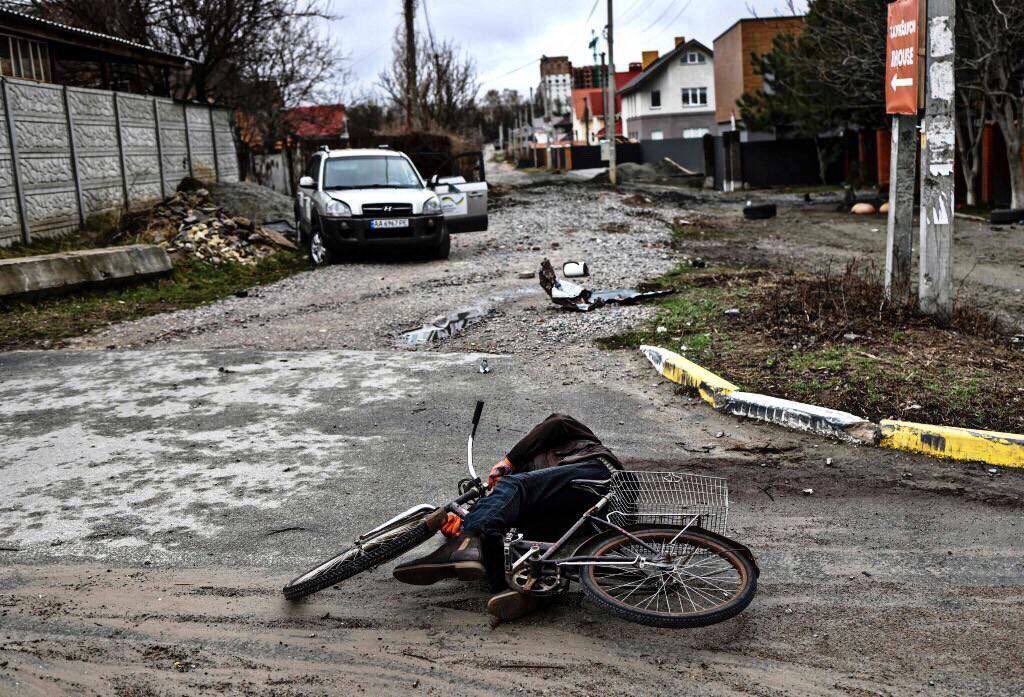 Dead civilian in Bucha
Dead civilian in Bucha
Any hypothesis on the current sentiments and situation within the ruling elite carries a large margin of error due to the hermetic nature of the system and the associated risk of deliberate disinformation. However, the available data indicate that influential figures have clustered into two groups. The ‘party of war’ consists of those in favour of continuing the aggression and even putting the entire country on a war footing; the ‘party of silence’ are those who seek to distance themselves from the issue.
But no ‘party of peace’ has emerged to actively lobby for ceasing hostilities and entering into negotiations with Ukraine. The entire state apparatus at both federal and regional level (the secret services, law enforcement bodies and the civil administration) has been involved in running the war machine.
No ‘party of peace’ has emerged to lobby for ceasing hostilities and entering into negotiations with Ukraine
The ‘party of war’ includes those who had a direct influence on the decision to launch the attack: Security Council secretary Nikolai Patrushev, defence minister Sergei Shoigu, chief of the General Staff Valery Gerasimov, FSB director Aleksandr Bortnikov and National Guard commander Viktor Zolotov. The force under Zolotov’s command officially has 340,000 officers and controls more than one million employees of security companies. Therefore, even though Zolotov remains in the shadow of political developments, his position as one of the guarantors of the regime’s stability has strengthened during the war.
According to available information, Putin was actively urged to launch the invasion by Yuri Kovalchuk, a key businessman and one of his close associates. Many high-ranking officials regard the adoption of a radically pro-war stance as a safe and easy way to maintain or strengthen their position in the system of power. These include former president Dmitri Medvedev, Duma speaker Vyacheslav Volodin and deputy head of the presidential administration Sergei Kiriyenko, who is responsible for domestic policy. Chechen governor Ramzan Kadyrov and head of the Wagner Group Yevgeny Prigozhin also belong to the ‘party of war’. They have frequently been at odds with the military high command, accusing it of incompetence on the battlefield, and they are seeking to influence the General Staff’s personnel policy.
The ‘party of silence’ is much more numerous. Although most of the regime’s beneficiaries were surprised by the outbreak of war, are frustrated with its effects (above all the sanctions that affect them personally) and most likely wish for a normalisation of relations with the West, any concerted action against the Kremlin’s policy seems impossible for the time being.
The leader is isolating himself from most state officials not only physically, out of concern for his own health, but also with regard to the information he receives. According to available data, Putin regularly consults only a handful of people, mainly Shoigu and Gerasimov. Members of the elite see no point in trying to convey alternative points of view to the president; they fear being suspected of insubordination or disloyalty, which could jeopardise their personal safety. There is also a deep mutual distrust among them. Those few members of the elite who dared to make some cautious anti-war remarks in public only did so during the first months of the invasion.
All that senior regime officials can afford to do at present is to remain silent and distance themselves from the issue of aggression. This stance has been adopted by such prominent figures as Prime Minister Mikhail Mishustin, Moscow mayor Sergei Sobyanin and central bank head Elvira Nabiullina (the latter’s work has been essential for maintaining Russia’s financial and economic stability in the face of sanctions).
Since autumn 2022, however, this position has become increasingly difficult to maintain: both the prime minister and the mayor of the capital city have been drawn into proclaiming their direct support for the war. To achieve this goal, the Kremlin resorted to the mafia principle of ‘collective responsibility’ (krugovaya poruka) which has commonly been applied under Putin’s rule: complicity in crime is supposed to guarantee full loyalty.
Last October, Mishustin was appointed head of the government’s Coordination Council, whose task is to ensure that the needs of the armed forces are secured during the ‘special operation’; Sobyanin is one of the Council’s members. The Moscow mayor visited the Donbas last December, presumably on Putin’s direct order. The decision to open branches of Sberbank, Russia’s largest state-owned bank, in occupied Crimea in 2023 is also part of this trend: it should be assumed that it was the result of pressure applied by the president on the bank’s head German Gref.
The Kremlin uses the mafia principle of ‘collective responsibility’: complicity in crime guarantees full loyalty
The Kremlin’s silent allies also include ‘state oligarchs’, who despite the economic crisis are still enriching themselves on wartime state contracts, thanks to their close ties to the key political decision-makers. Sergei Chemezov, head of the state-owned Rostech (part of the arms industry), and the family of Nikolai Patrushev are among those who have been strengthening their positions in this way.
The setbacks in Ukraine have provoked public criticism of senior commanders and security services, especially the FSB. Numerous reshuffles in the command of the ‘special operation’ testify to differences of opinion within the military community as to how it should be conducted. One consequence of the problems on the battlefield is the unprecedented public disapproval of the defence minister and the chief of the General Staff. Nonetheless, Putin has chosen not to institute radical personnel changes, fearing that this could lead to a crisis in his inner circle, which is why he has ostentatiously supported the defence minister. The appointment of Gerasimov as commander of the operation in Ukraine in January 2023 was another move designed to confirm the Kremlin’s trust in the military.
The Kremlin has acted in a similar fashion towards the leadership of the secret services responsible for preparing actions to destabilise the Ukrainian state. Emerging reports that assets have been embezzled from the operational fund have been covered up, and any possible personnel changes have been kept secret. FSB chief Bortnikov has avoided public criticism, and his institution’s position in the system has been maintained.
Public sentiments
The results of public opinion polls should be approached with caution. It is forbidden to ask about attitudes towards the war: polls refer to the ‘special operation’ or the ‘Russian military operations in Ukraine’. The support publicly declared for the government’s moves may diverge from the true views of those surveyed.
According to the estimates of some sociologists, around 20% of Russians genuinely approve of the invasion, and a similar proportion of respondents are staunch opponents of it. The remainder (c. 60%) distance themselves from the subject, have not formulated clear views on the situation (the majority would accept virtually any decision of those in power with regard to Ukraine) and are focused on their day-to-day survival.
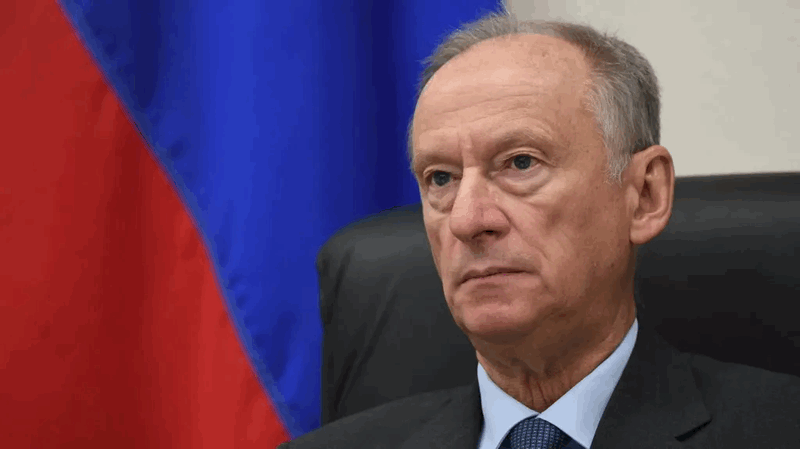 Nikolay Patrushev, head of Putin's Security Council, former director of FSB
Nikolay Patrushev, head of Putin's Security Council, former director of FSB
At the same time, declared support for the ‘special operation’ remained at around 70% in December 2022, even though a large part of the population is aware of the problems on the battlefield and does not trust the official casualty figures. Contrary to expectations, the mobilisation launched last September and the considerable number of dead and wounded have not shaken the stability of the regime. Nor has it translated into either strong anti-war protests or a decline in declared support for Putin, which still hovers around 80%. Although half of the respondents have a negative attitude towards a possible second wave of mobilisation, its implementation would be unlikely to trigger widespread resistance. Russian citizens seem to be slowly getting used to the war; in surveys by Levada Centre, more than 40% now estimate that the conflict will last more than a year.
This state of affairs largely stems from individual defence mechanisms. Wartime censorship has led to the monopolisation of most of the media space by state propaganda. The public has a nagging sense of powerlessness and inability to influence the situation. They also feel a strong desire to fit in with social norms; the media have been successful in creating an image where the ‘patriotic majority’ clearly dominates and opponents of the war are not only the enemies of Russia, but also represent a fringe of the population.
Great-power rhetoric and geopolitical revanchism were used for decades to compensate citizens for their political disempowerment
Willingness to express ‘anti-state’ sentiments is further tempered by the fear of repression for ‘wrongdoing’ and the dependence of the majority of citizens on money from the state budget. It is worth mentioning here that great-power rhetoric and geopolitical revanchism have been used for decades in Russia to compensate the country’s citizens for their political disempowerment, the lack of a vision for the future, and for the country’s mounting economic difficulties.
Prospects
Future developments in domestic politics mainly depend on the dynamics of operations on the battlefield. If the scale of Western military aid to Ukraine does not increase considerably, the war will drag on and the situation in Russia will not change in any substantial way. The Kremlin will continue to prioritise pressing on with the invasion, regardless of the short-term economic losses and the long-term negative impact on Russia’s development prospects.
The war will serve as a backdrop to and an instrument of Putin’s presidential campaign before the elections scheduled for March 2024. There are reports that a decision has been made on his run for another term (the constitution allows him to rule until 2036). His campaign is likely to be based on the slogans of ‘national unity’ and the new ‘Patriotic War’ – that is, Russia’s defensive war against the West.
Regional and local elections in September 2023 will become a test of the electoral system’s efficiency in the midst of armed conflict. The government’s candidates are expected to include a large number of war veterans. These polls are supposed to also be held in the territories formally annexed in September 2022.
We should expect social adaptability to the war and the deepening economic crisis to remain high as long as the authorities continue to provide social assistance to the poorest. The further militarisation of public discourse and the construction of the myth of a new ‘Patriotic War’ will be underpinned by a new social stratum made up of those who have been through the ‘special military operation’ and their families. The war will also bring an increase in domestic violence, both in the public and private spheres.
In the event of more Russian battlefield defeats, we should expect to see a reshuffle among senior government officials, in order to find scapegoats and improve Putin’s image in the run-up to elections. Any signs of rising discontent among members of the ruling elite may trigger purges within its ranks, for example through criminal cases for corruption. The further intensification of repression for anti-regime and anti-war attitudes seems likely, especially as the previously overcrowded prisons are emptying as a result of the mass recruitment of criminals. The planned increase in internal security expenditure (by almost 100%, compared to 2021) testifies to the regime’s readiness to step up repression.
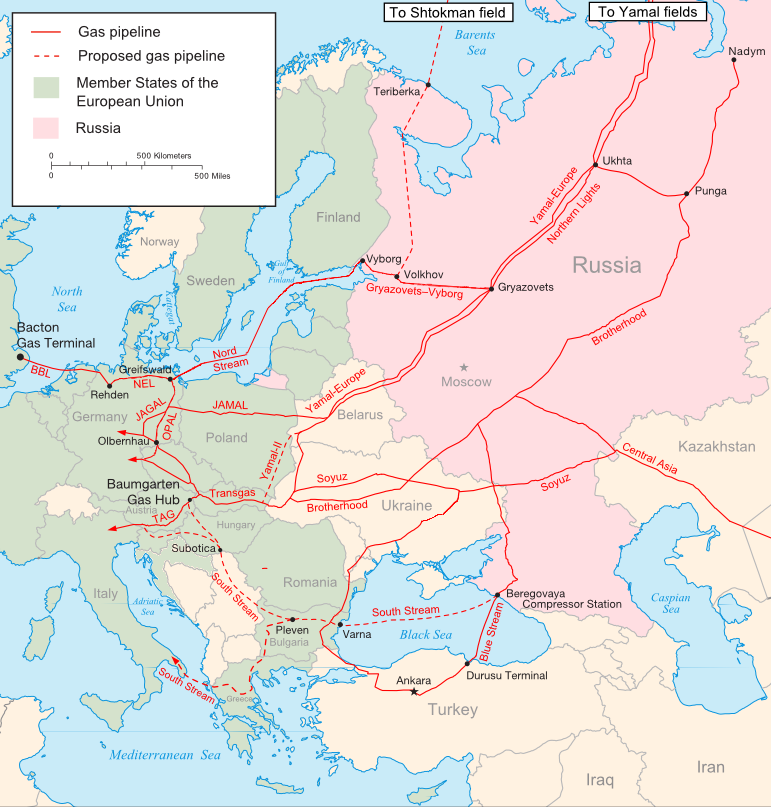
There is no indication of any potential split within the ruling elite (which is the only thing that could lead to a change in the political leadership) in the foreseeable future. An outbreak of mass protests also seems unlikely, despite deepening frustration with the economic problems and periods of panic caused by mobilisation. However, given the dynamic nature of developments and the scarcity of verifiable information, no scenario should be dismissed outright. Nevertheless, it appears that the elite would only take active steps against Putin in the event of an outright military defeat in Ukraine and an accompanying severe economic crisis.
This article was published by OSW Warsaw.

